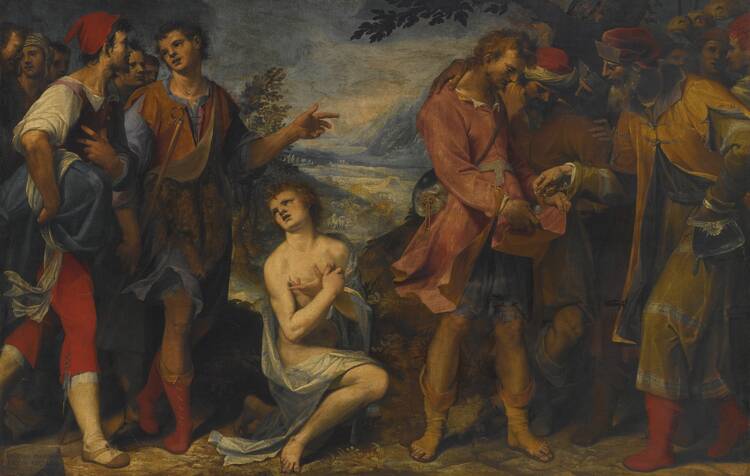A Reflection for the Thursday of the Fourteenth Week in Ordinary Time
Find today’s readings here.
“Come closer to me,” he told his brothers.
When they had done so, he said:
“I am your brother Joseph, whom you once sold into Egypt” (Gen 45:4).
In a Christian literature class I took in college, we read, alongside authors like Dante, Flannery O’Connor and William Faulkner, a few chapters from Genesis. My professor considered the tale of Joseph being sold into slavery by his brothers a near-perfect example of storytelling. It has it all: jealousy and betrayal, redemption and reconciliation. You could read it to a 5-year-old, and they would be captivated, he said.
To recap: Joseph is the favored son of Israel (née Jacob). Joseph’s envious older brothers sell him into slavery in Egypt and lead their father to believe he has been killed by wild beasts. In Egypt, Joseph rises to become the vizier of Egypt because he properly interprets Pharaoh’s dreams and predicts seven years of feast, followed by seven years of famine. Joseph is put in charge of collecting surplus grain during the boom times and distributing it when the famine comes.
In today’s readings, we reach the emotional climax of the story. Twice the older brothers have traveled to Egypt to buy grain, not knowing that the vizier saving them from hunger is their long-lost brother. But Joseph recognizes them and tests whether they are honest men by secretly placing a silver cup in the sack of Benjamin, now Israel’s youngest and most favored son, and then demanding that Benjamin become his slave when the chalice is “discovered.”
Judah, who once sold his own brother into slavery, now offers to take the place of his youngest brother as Joseph’s slave. He begs the vizier not to take Benjamin and recounts the words of their father: “If you now take this one away from me, too, and some disaster befalls him,
you will send my white head down to the nether world in grief” (Gen 44:29.) At this, Joseph breaks down in sobs and reveals his true identity:
“I am your brother Joseph, whom you once sold into Egypt.
But now do not be distressed
and do not reproach yourselves for having sold me here” (45:4-5).
One of the maxims of great storytelling is “show, don’t tell.” Here we have one of the most dramatic and poignant demonstrations of what forgiveness looks like in the entire Bible. The author of this story doesn’t tell us that Joseph forgave his brothers; he shows us his tears, his generosity, his embrace of those who betrayed him.
What is true of fiction is also true of faith. We can’t just say “I forgive you”; we must act in ways that make that forgiveness recognizable and felt. There have been plenty of times in my life when I have offered forgiveness to someone who has hurt me and apologized but then continued to be distant or punish them in small ways.
Truly meaning our forgiveness is no small thing. Joseph’s act of forgiveness is the foundation of the House of Israel. His story acknowledges that forgiveness is difficult; Joseph tests his brothers mightily before they are reconciled. But his story also shows how we can arrive at forgiveness: “It was really for the sake of saving lives that God sent me here ahead of you” (45:5). It is Joseph’s trust that God can work through even the worst of human betrayals that makes it possible to reconcile with his brothers. We should ask ourselves: Do I trust God enough to forgive my brothers and sisters?








